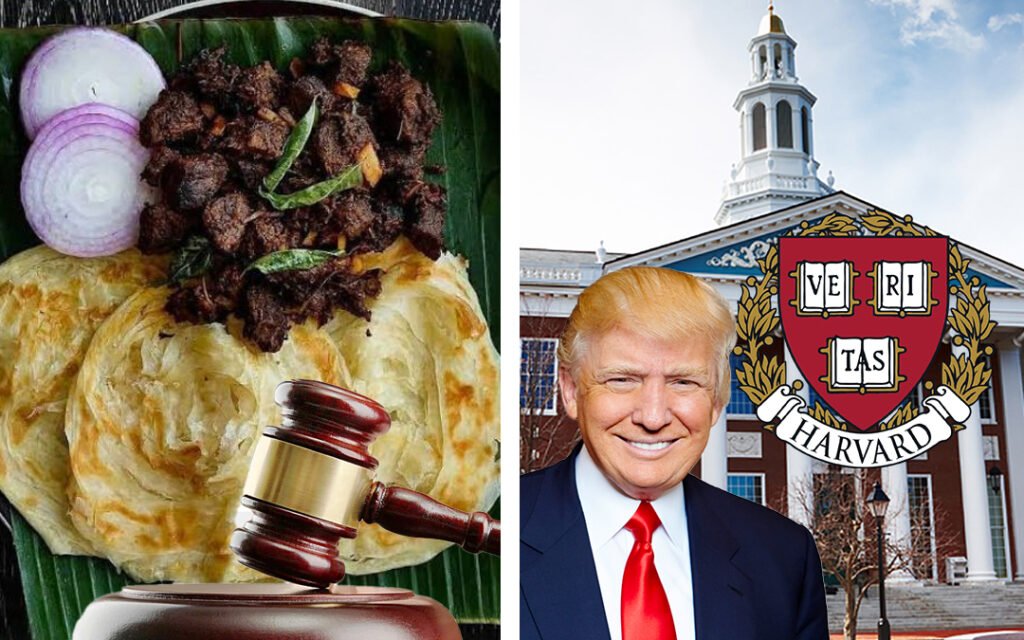In an unassuming restaurant in Kerala’s Ernakulam district, a journalist ordered a plate of beef fry and parotta, a beloved staple in southern India. But what sparked a larger cultural debate wasn’t the food, but the absence of free gravy. The journalist filed a complaint, seeking ₹1 lakh in compensation for emotional distress, only to have the consumer court dismiss it, declaring there’s no legal mandate to serve gravy for free. On the surface, it seems laughable. But in that rejection lies a metaphor for a growing global sentiment: the era of entitled extras, whether in food or education, is being reconsidered.
Fast forward to a much grander, more explosive stage: US politics. Former President Donald Trump, known for his bluster and battle cries, is once again targeting elite academic institutions. Harvard University now finds itself in his crosshairs, as he threatens to withdraw $3 billion in federal grants, accusing the institution of fostering antisemitism and “protecting radical foreign students.” Trump’s bombast may be characteristic, but his message taps into a global undercurrent, a shift from institutional largesse to transactional accountability.
From the parotta-gravy scuffle in India to Trump’s tirade against Ivy League privilege, we’re witnessing a hardening of attitudes toward entitlement and subsidy. A worldwide “no-freebies” philosophy is gaining traction, challenging not just what we deserve, but what we’re willing to pay for. Governments are trimming welfare packages. Universities are facing pressure to justify international admissions and public funding. Consumers are being told, gently or otherwise, that generosity is not an obligation.
The debate isn’t about gravy or grants, it’s about value, responsibility, and changing social contracts. In the past, free extras, whether academic resources, condiments, or healthcare, were seen as signs of generosity, a social glue that bound people to institutions. But with economic pressures mounting, and populist narratives rising, the pendulum is swinging the other way. “If you want it, earn it. If you use it, pay for it,” seems to be the new mantra.
This shift also exposes a deeper anxiety. When Harvard’s global student body is painted as a threat rather than an asset, or when a request for free gravy is framed as an unreasonable demand, we must ask: Are we redefining fairness, or merely rationing empathy? As institutions become more transactional, the risk is a colder, more commodified world, one where generosity is considered wasteful, and community is a footnote.
Where are we heading? Perhaps to a world where nothing, not education, not hospitality, not even a spoonful of gravy, comes without a price tag. Whether that’s a return to accountability or a slide into cynicism depends on who’s doing the asking, and who’s holding the ladle.
One thing is certain: the days of expecting something for nothing are numbered. From local eateries to global universities, the free lunch, or at least the free gravy, may be off the menu for good.
- Gangadhar Krishnamoorthy appointed as Senior Vice President – Manufacturing & SCM Excellence at JSW Steel
- Sunanda Khaitan appointed as Chief Marketing Officer – Beauty & Wellbeing at Unilever
- Rachit Mishra appointed as Head Brand & Digital Communications at ArcelorMittal Nippon Steel India
- Zuellig Pharma Announces Acquisition of Zam-Buk® and Vapex® from Bayer
- Marico Limited Acquires 60% Stake in Cosmix at ₹375 Crore Valuation









